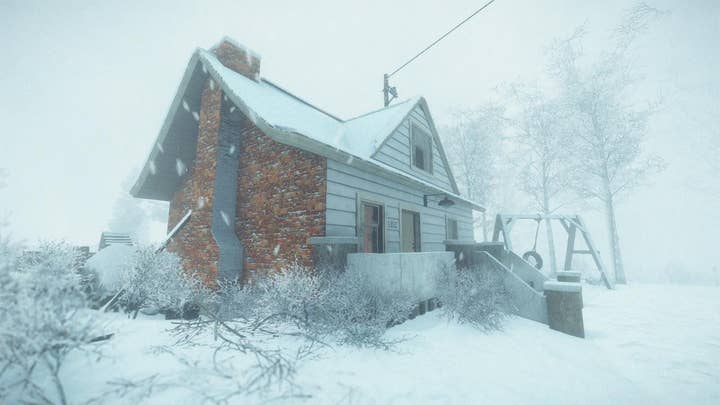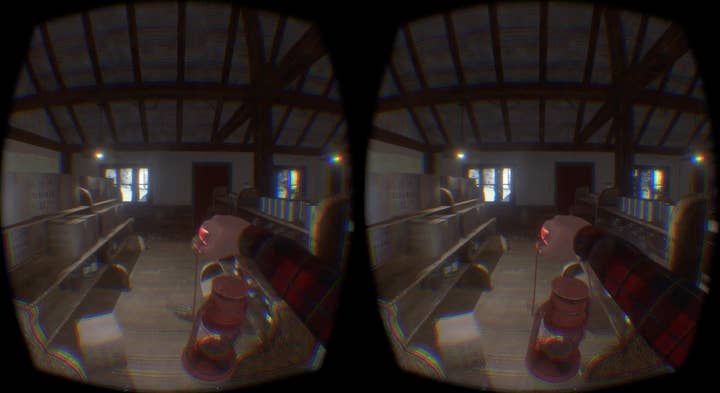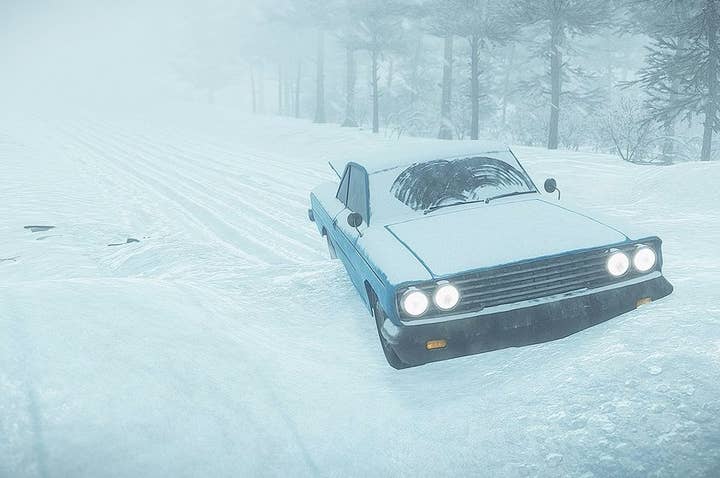"Episodic is kind of a poisoned word right now"
Parabole's Alex Fiset finds a new approach to segmented storytelling in Kona
It's a pretty typical indie origin story: three friends living in a development hub, working at a studio owned by a major publisher, decide to leave and go it alone to make something of their own. A few years and a successful Kickstarter later and the game is in early access: an episodic, first-person adventure with light survival elements called Kôna.
Alexandre Fiset is one of those friends, and now CEO of Quebec's Parabole. Taking their leave from Activision's Beenox studio, where they worked on Spiderman sequels, Fiset, Etienne Lemieux and Maxime Charbonneau have taken inspiration from their frozen surroundings, local indigenous culture and pulp detective novels to bring their first indie game to life.
And it's great. Atmospheric, well written and with good voice over work, Kôna is a beautifully restrained vision of a small Canadian wilderness village gone Marie Celeste - abandoned and silent when the player's gruff private eye turns up to look for his new employer. It's eerie and suspenseful, making the most of a '70s setting without over seasoning everything with Paisley and stadium rock, settling instead for a notable absence of mobile phones and GPS, plus the occasional vintage hockey card. Survival mechanics are limited to a need to stay warm, keeping the focus on narrative whilst keeping a healthy respect for the sub-zero environment.
"I think it's a mistake to go on and create a company without knowing your industry"
It's not the team's first project as Parabole. After cutting their teeth at Beenox, Fiset and friends did some contract work for the Canadian government, producing health apps and educational tools, as well as some advertising work. I'm a little surprised that they didn't dive directly into their first indie project once they'd slipped the bonds of Activision, but Fiset exhibits a level headed approach to personal development.
"I think it's a mistake to go on and create a company without knowing your industry," he explains when I ask about his time at Beenox. "Activision is a great company when you want to learn how to sell a game, so they had this internal culture of, 'We make games that sell.' This is their motto. Like, this is what they say to people in the company. You have to make great games, but they have to sell. So it's a good thing to keep in mind, because we have employees here that need that kind of thing that is called money. So, yes, I think that the four years I spent at Activision is something that I'll keep on my CV. I don't blame them for anything. I think they do what they have to do, this is a big player. They want returns. They have a different perspective. They want to satisfy their investors. We don't have to do that, because the investors are actually the developers."
There's a real efficiency to Kôna's presentation, an economy of style which marries excellently to the snowbound environment, and an almost total lack of human interaction. Wolves prowl the forest, and there's very definitely something bigger out there too, It's a brilliantly desolate, isolated experience as a result, but I wonder aloud if some of these decisions were made to keep creative overheads low by cutting out dialogue, animations and long draw distances.

"The original idea behind Kôna was basically that we'd made a snowmobile in a snow field. You only took jumps, so it was closer to a snowmobile simulator than it was an actual adventure game. Then we decided to create a world around this character. We were three people, so basically the first thing we did was add houses. Then we got a writer in the place, and then we got more budget...
"You will have encounters later on in the experience, but the goal is to slowly introduce things to you. So, it starts as a game which is similar to Gone Home in a way. You just have to explore and click on things, and there is no sense of danger. You feel lost in the wilderness, but that's about it. But then you will encounter someone, and you will have to do something for that person, and then it goes on and on developing, chunk by chunk around the character. It's similar to the process we've made with developing it. We started with something pretty simple and rudimentary and had layers and layers and layers of complexity and depth around the character.
"So, you will have encounters, but not as many as you would in a Skyrim game. This is a production decision, money. If we had an infinite amount of money for sure you would have to visit, like, a village or something, but considering the fact that we divided it into acts, you can expect that in later episodes. So we're starting with something simple and building around it to expand and make this world more complex. So, to answer directly your question, yes it's a production decision to make it simple, but you can expect it to grow."
"'Episodic' is kind of a poisoned word right now, it's tough to say it out loud, but it's not like a Telltale game"
Those later episodes promise to be interesting, with Fiset and his team taking an interesting gamble on the traditional chapter-based storytelling of most episodic content. Rather than simply finishing each segment with a cliff-hanger and a to be continued, the Parabole team is going to conclude each story arc within a single episode, with every following act covering the same events from a different perspective.
"Basically, Kôna: Day One is about Carl (the private eye), but in episode two you're playing as a Cree (Quebecian indigenous tribe) woman. She has her own set of skills. Everything that surrounds her, the music, the gameplay mechanics, everything is different. So you're basically playing another game but in the same universe. There are some, like, links, obviously. So yeah, it's an episodic thing. 'Episodic' is kind of a poisoned word right now, it's tough to say it out loud, but it's not like a Telltale game. I mean, it's not like Kentucky Route Zero. You will not find yourself at the end of the experience saying or thinking, 'Oh no, like, it sucks because there's a 'to be continued' there and I don't know a lot of things.' There are things that get wrapped in one episode. Yes, there will be openings, questions still need to be answered, but I think that after five hours of game you will be satisfied and you won't feel like it's only half a game. I think it's one game, and the others are other games in the same universe."
The culture of the Cree people looks like it could be a key theme. The game is set in Cree lands, with Hamilton's rabid mining destroying pristine forests and ancient tundra. The Cree hover at the edges of the first episode, their legends and traditions referred to here and there, but Carl is very much a Canadian protagonist. That's clearly an easier prospect for Canadian writers, happy to poke a little at national idiosyncrasies, but narrating from the perspective of a culturally distinct player character is fraught with potential danger. Fiset says the team wants to be as respectful as possible.

"We approached the Cree in Quebec City, an office where they promote the Cree culture. So they gave us DVDs and they gave us books and some advice. So we studied these things. In the first episode, you're a Canadian, so it's not that much like the Cree culture, but we wanted to have some elements. Here and there you will find objects, things that link to them. They're part of the story but I think they're playing a good role. I mean, Hamilton is kind of the rich guy who builds copper mines in the north, and they accuse him of destroying sacred lands for his profit. It's a historical fact that they always fought against building dams, destroying forest and destroying land for companies and everything. So what is shown here is their appreciation of nature. It's not like we talk about how they deal with alcoholism and all those kind of things. We're not getting into the negative subjects. We're only hitting the positive ones.
"In the next episode we will need to find music, find musicians, find voice actors, find everything, to build that character. So that will be a challenge: making sure that it's a character that represents them like Carl, which is a Canadian, is representing Canada. We have to deal with the Cree woman the same way we deal with Carl. Carl, we made like ourselves, but for the Cree woman we will have to find a voice actress that is actually a Cree woman, and we will have to find people to help us build our back story."
Kona: Day One is available now in beta on GoG.

